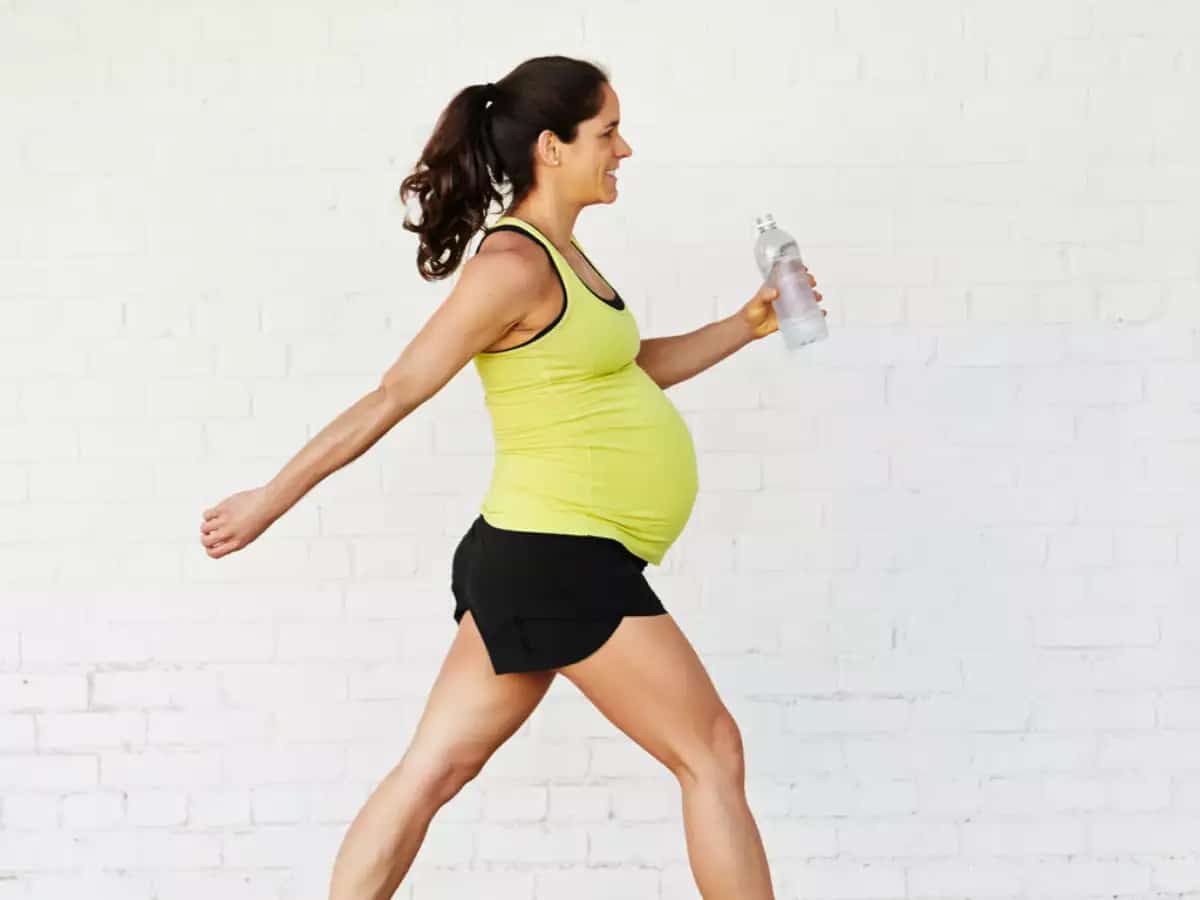Have you ever heard anyone talk about jogging during pregnancy? If you have, it is likely because the topic of fitness during pregnancy was been discussed.
Pregnancy can be a beautiful but stressful experience, as it is also capable of wreaking havoc on your body. This is because the baby is literally growing inside of you.
Pregnant women tend to feel exhausted, and nauseous, and also have to deal with fatigue, pregnancy brain fog, mood swings, and weight gain. Most women would typically prefer to sleep or relax and need to pee every five minutes, which is natural.
But that isn’t the best option. Regular workout like jogging during pregnancy can be very beneficial to both mother and child.
Staying active during pregnancy can greatly improve the way you feel physically and mentally.
Exercise increases the production of endorphins hormones, which could make you feel good as well as elevate your mood. This makes exercising during pregnancy a very helpful way to check depression as well as the improve both your physical and mental health.
Per information from the American College of Obstetricians and Gynecologists (ACOG), pregnant people should get no less than two and a half-hour of moderately intense aerobic activity every week.
These are simple workouts such as jogging during pregnancy which is more advisable to do, instead of running, can help raise your heart rate and induce sweating, It also helps to reduce the risk of gestational diabetes, high blood pressure (pre-eclampsia), and giving birth to an overweight baby.
If you are able to exercise for 30 minutes five days a week, you would certainly meet the 150-minute recommendation. You don’t necessarily need to spend all this time jogging, you can also build in other activities as well, such as swimming, yoga, or walking.
For sure, there would be well-meaning friends and family members, who might warn against jogging during pregnancy as an exercise. They might be worried about the level of intensity, and if it could induce early labour, or worse, cause pregnancy complications.
No doubt, this advice and concern come from a good place. However, the truth is that jogging during pregnancy is generally safe because it is not too intense, and it wouldn’t cause a miscarriage or harm your baby. And if a pregnant woman is constantly fed these fears or questioned by others, you might become too cautious and stop working out completely.
If you had a regular work out routine before now, being pregnant would have some impact on your workout routine. You may have to modify your activities and engage in less stressful active, but you definitely don’t have to simply stop.
If you used to be physically active before pregnancy, it shouldn’t be much of an issue to stay active. All you may need to do is to adjust your expectations and the intensity of your workouts along the way.
What if you weren’t jogging before pregnancy, can you start jogging now?

Well if you didn’t exercise before pregnancy, adding some type of physical activity into your daily routine would be of great benefits. Nevertheless, pregnancy is not the time to start your Olympic career.
Pregnancy already puts your body through a lot of hard work due to changes. Therefore starting an intense workout would not be ideal as it puts your body to more physical stress.
Instead, you should opt for lighter workouts, such as gentle aerobics, yoga, walking, or using an elliptical at a low speed. However, you can develop a routine, but start slowly and gradually increase the length and intensity of your workouts. You can start with a 5 minutes walk today, and then increase to 10 minutes, 20 minutes, and 30 minutes.
If you feel there is a need to adjust your routine. As you get closer to your due date, maybe you are not able to jog as far, long, or fast, you should listen to your body language and adjust.
Before you jump right into your regular workout, here are some challenges you may encounter.
Things to consider before jogging during pregnancy
- During pregnancy, your joints and ligaments become really loose. This is because of the large quantity of relaxin hormone your body produces. This hormone helps to relax ligaments in your pelvic region in preparation for childbirth. It also relaxes ligaments and joints in other parts of the body in the process; this puts you at an increased risk of injury. So you must be very cautious and avoid an intense workout.
- Pregnancy changes your body structure, so you may deal with a change in your centre of gravity and balance as your belly size continue to increases for 9 months. This puts you at risk of falling if you’re not careful, so it is advisable that you don’t jog on uneven trails. Instead, you can make use of flat surface pavements such as the sidewalk; this would help prevent an accident, and also go easier on your joints. Also, as your belly gets bigger in your second and third trimester, you may start to feel uncomfortable due to the bouncing motion it causes. However, you can start wearing a belly support band to help reduce this bouncy movement.
- Depending on the circumstances you find yourself, you may have to stop jogging at some point in your pregnancy, until after your delivery. Signs that you need to stop jogging include headaches, chest pain, muscle weakness, vaginal bleeding, calf pain, or amniotic fluid leaks. Make sure you speak to your physician if any of these happens.
Things to consider while jogging

- Schedule an appointment with your obstetrician before starting your jogging routine. If you were a runner before you became pregnant, it’s okay to continue. But jogging during pregnancy for the first time is less safe because your body is not used to such exercise.
- You should wear something comfortable, preferably supportive workout clothings. You need a sports bra that is supportive, since your breasts will ikely have swollen since you got pregnant. Invest in new running shoes. Keep in mind that pregnancy induces lots of relaxing hormones, which increase the laxity of your ligaments, and makes it easier for sprains and strains to occur if you do slip or stumble.
- Take a short route that is less intense than normal and is on track; one way to avoid falling is to avoid running on uneven surfaces. A track plain track would be your best option, as it also will not leave you stranded out and about in the case of an emergency
- Always let someone know when you’re going for a jog and don’t forget to carry a mobile phone so you can contact someone if you start to experience warning signs of a problem so that you wouldn’t be left stranded in case of an emergency. Also avoid jogging in extreme weather conditions, particularly the heat, to avoid a raise in your internal body temperature to a dangerous level. If it’s too hot outside, run indoors on a treadmill.
- Always carry water with you to drink, consume at least 7 to 10 oz every 10 to 20 minutes. Dehydration can affect your pregnancy and may cause contractions, so it’s important that you continue to drink water during exercise.
- Always keep check of how you feel in your body and about your comfort level as you run. Never run so fast that you become fatigued. By the time you are getting to the second and third trimester, jogging can be hard on the muscles in your pelvic floor, as well as your core and your abs, as the baby continues to grow, you become more vulnerable to injury and other complications. If you experience warning signs such as cramps, contractions, bleeding, vaginal discharge, nausea, light-headedness or a sudden change in body temperature, just stop jogging, your next action would be to call your obstetrician immediately.
- If you feel the need to pee, do so as quickly as possible. Now that there is an extra weight of your uterus constantly pressing on your bladder, you would need to hit the toilets more often than usual, especially when you jog. This may happen more often in the third trimester. So make sure there are restaurants or public bathrooms along the route you choose.
- Maintain a neutral posture while running. If you are not certain about the impact of your running posture, you can seek a second opinion from your practitioner or an experienced personal trainer who works with pregnant women.
- Always be kind to yourself. Don’t forget that exercising wouldn’t have been so tiring if you weren’t working out for two. It’s normal for fatigue, morning sickness, nausea, constipation or frequent urination to interfere with your workout during your first trimester And then weight gain and physical discomforts at your second and third trimesters.
When should you Stop jogging?
Jogging during pregnancy is safe, even if it is considered high impact and may occasionally cause problems, you just have to be cautious.
You should be mindful of how long you can endure, and don’t test yourself above limits. But if you experience the pain of any sort, you have to stop jogging immediately.
Always have in mind that you are more prone to bladder leakage, during pregnancy, especially when you’re bouncing up and down as you jog. If there happens to be a painful discharge of urine, contact you OBGYN right away.
Stop jogging if your obstetrician advises. You can stay fit with other exercises, such as walking and or yoga.
Your Diet
As a pregnant woman, who has put on the more pounds, you’ll need more energy than ever to go about your workouts.
Starting from the second trimester, you’ll need to consume about 300 extra calories to fuel you and your baby every single day, regardless of your jogging exercise. This means you’ll need even more once you’re exercising.
Having said this, you should ask your doctor about specific caloric needs for your weight and activity level. Practice a healthy pregnancy diet with the foods and eating schedule that suits your condition.
Final thoughts
Make sure you keep your meals small and frequent. If you get the frequent urge to eat, try feeding on small but healthy snacks or smoothies or protein shakes throughout the day instead of whole meals, this can help you gain the extra calories that you need without a side of nausea.
Don’t forget to drink up lots of water. It is very vital to stay hydrated during your running workouts. Jogging during pregnancy shouldn’t be much of a problem if you have company. Do well to get a jogging partner if you don’t want to workout alone.












